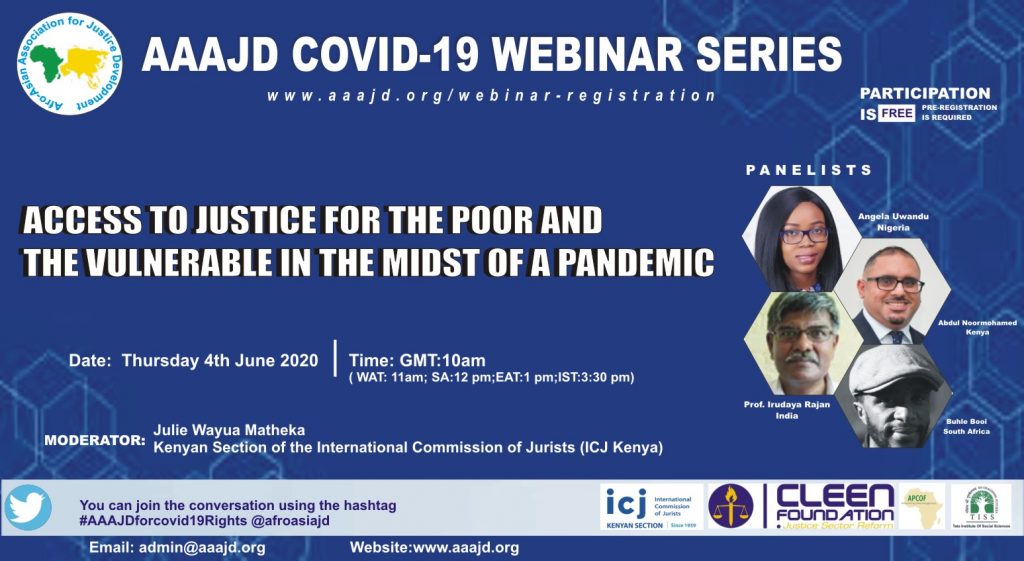TOPIC: Inclusive Development and Rights: challenges and opportunities thrown up by Covid-19
DATE: 11th JUNE 2020
TIME: GMT 10am (WAT: 11am; SA: 12pm; EAT 1pm; IST: 3:30pm)
Registration: https://aaajd.org/webinar-registration/
Covid-19 has seen widespread violations of rights, including the right to life as also civic and economic rights. The people on the margins have borne the brunt of the pandemic. The impoverishing of the poor and exacerbation of inequalities has raised questions about welfare provisioning and public service distribution to deal with the pandemic. Struggles for more inclusive development are occurring at various levels. When looking at the different redistributive measures of states, significant variation can be seen in their capacities to reduce inequalities and have inclusive systems. As we move towards opening societies battered from the pandemic and getting the wheel of economic development spinning again, it is important to deliberate on how inclusive systems and processes can be built for development of poor and vulnerable.
In this context, it is important to discuss how citizens / groups connect to the state and its various entities. While political representation can be a determinant for channeling demands for inclusive systems and creating structures for inclusive development, it is also important to deliberate beyond formal processes and elected representatives, by also looking at pressure-groups and informal community-based, local systems and process. This is important for having inclusive policies for justice and development. It will involve both, an understanding of the systems and processes that exacerbate vulnerabilities, and what can create opportunities for inclusive development.
OBJECTIVES OF THE DISCUSSION:
-
-
- Discuss the experiences and lessons learnt in welfare provisioning and public service delivery to the vulnerable in the face of the COVID pandemic.
- Debate the challenges associated with access and delivery of social security schemes.
- Share alternative strategies and mechanisms that have emerged to reach out and include the poor in relief and sustenance measures.
- Share the local communities’ efforts to safeguard and evolve survival processes.
- Recommendations for people-centered, community-based strategies, built on local understanding and consultations, as a core pillar for inclusive development.
-
MODERATOR: Prof Madhushree Sekher, Chairperson International Relations Office and Professor Centre for Study of Social Exclusion and Inclusive Policies, Tata Institute of Social Sciences, Mumbai (India)
PANELISTS
-
- India: Dr Shailesh Kumar Darokar, Centre for Study of Social Exclusion and Inclusive Policies, TISS
- Kenya: Ms.Ruth Getobai who is a Regional Coordinator with the Kenya National Commission on Human Rights
- South Africa: Amanda Rinquest is a National Education and Training Manager at Black Sash, South Africa. She is also an attorney of the High Court and a human rights activist.
- Zambia: Dr John Bwalya, Director, Dag Hammarskjold Institute for Peace and Conflict Studies
- Nigeria:Mr. Jake Epelle, Executive Director, Albino Foundation



